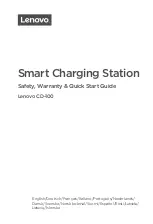
GB
15
5).
3.
Pre-charge the battery for 5-10 minutes as
described in point a) “Charging the battery”.
4.
Press the pushbutton of the remote starting
device and simultaneously start the vehicle
(Figure 14).
The overload switch switches off the equipment after
a short time. If starting has failed, you can press the
button of the overload switch back in again after
approx. 3 minutes and repeat the starting operation.
Starting is easier if the battery is charged at the
highest charge setting for approx. 10 minutes prior to
starting.
6. Overload cut-out
Fig. 15:
The integral overload switch protects the device from
overloads and short circuits. When the overload
switch trips, its pushbutton will jump further
outwards; after a brief cooling break of approx. 5
minutes it can be pushed in again. The thermal cut-
out wound into the transformer protects the
equipment from overheating.
Fig. 16:
The strip fuse on the rear side of the equipment
protects the equipment from short circuits and
polarity reversal. Changing the strip fuse: Use a fuse
with the same ampere value.
Note:
In the case of flat batteries, an overload switch may
trip at the upper charge settings in particular when
the mains voltage is excessively high. In this case it
makes sense to pre-charge the battery at a low
charge setting (if available) for a short time until the
overload cut-out holds.
7. Maintenance and care of the battery
n
Ensure that your battery is always fitted securely.
n
A perfect connection to the cable network of the
electrical system must be ensured at all times.
n
Keep the battery clean and dry. Apply a thin
coating of grease to the connection terminals
using an acid-free, acid-resistant grease
(Vaseline).
n
Check the level of the acid in batteries that are
not maintenance-free versions approximately
every 4 weeks and top up with distilled water if
necessary.
8. Cleaning, maintenance and
ordering of spare parts
Always pull out the mains power plug before starting
any cleaning work.
8.1 Cleaning
n
Keep all safety devices, air vents and the
housing free of dirt and dust as far as possible.
Wipe the equipment with a clean cloth or blow it
with compressed air at low pressure.
n
We recommend that you clean the device
immediately each time you have finished using it.
n
Clean the equipment regularly with a moist cloth
and some soft soap. Do not use cleaning agents
or solvents; these could attack the plastic parts
of the equipment. Ensure that no water can seep
into the device.
n
The charger should be placed in a dry room for
storage. Any corrosion must be cleaned off the
charging terminals.
8.2 Maintenance
There are no parts inside the equipment which
require additional maintenance.
8.3 Ordering replacement parts:
Please quote the following data when ordering
replacement parts:
n
Type of machine
n
Article number of the machine
n
Identification number of the machine
n
Replacement part number of the part required
For our latest prices and information please go to
www.isc-gmbh.info
9. Disposal and recycling
The unit is supplied in packaging to prevent its being
damaged in transit. This packaging is raw material
and can therefore be reused or can be returned to
the raw material system.
The unit and its accessories are made of various
types of material, such as metal and plastic.
Defective components must be disposed of as
special waste. Ask your dealer or your local council.
Anleitung_BT_BC_30_SPK1__ 06.06.13 14:42 Seite 15
Содержание BT-BC 30
Страница 2: ...2 1 cm 1 2 6 3 9 8 3 2 1 4 5 7 H2O dest Anleitung_BT_BC_30_SPK1__ 06 06 13 14 41 Seite 2 ...
Страница 4: ...4 10 11 15 13 12 14 Anleitung_BT_BC_30_SPK1__ 06 06 13 14 41 Seite 4 ...
Страница 5: ...5 16 Anleitung_BT_BC_30_SPK1__ 06 06 13 14 41 Seite 5 ...
Страница 68: ...68 Anleitung_BT_BC_30_SPK1__ 06 06 13 14 42 Seite 68 ...
Страница 69: ...69 Anleitung_BT_BC_30_SPK1__ 06 06 13 14 42 Seite 69 ...
















































